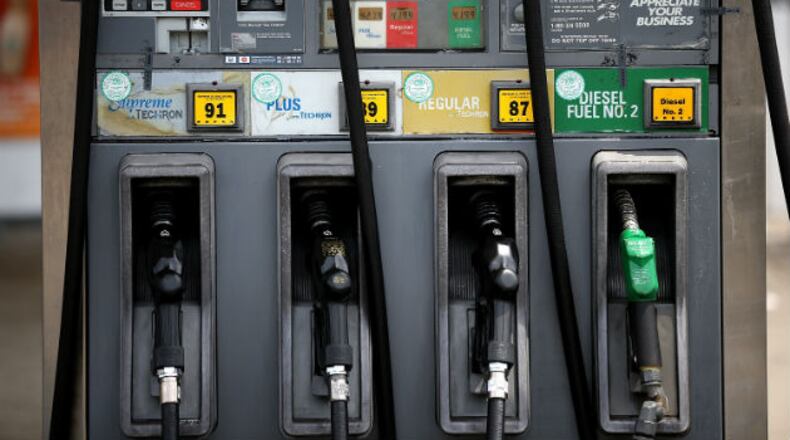Ohio Gov. Mike DeWine and House Speaker Larry Householder, both Republicans, announced their deal Thursday under which the gas tax would go up 11 cents and the diesel fuel tax would also rise by 20 cents per gallon.
But Senate lawmakers weren’t in agreement yet.
“We’re not comfortable with those numbers,” Sen. Matt Dolan, a Republican from Chagrin Falls in northeastern Ohio, said.
The original Senate plan increased the current tax of 28 cents a gallon for gas and diesel by only 6 cents. Householder said the current Senate proposal involves an 8.5 cents-per-gallon gasoline increase and a 13 cents-per-gallon increase on diesel.
Householder put pressure on Senate lawmakers to act, saying that making tough decisions comes with the job.
DeWine called the 11-cent compromise a way to “improve and maintain” safer roads and bridges across Ohio.
Ohio hasn’t increased its state gas tax since 2005.
The House and Senate, in the meantime, have agreed on a figure that would boost public transportation funding, adding $70 million a year, up from the current $33 million.
THURSDAY STORY: Negotiations over a contentious gas tax hike continued Thursday with the DeWine administration and Ohio House favoring a higher increase and the Ohio Senate pushing back.
A six-member conference committee working on a compromise reached agreement Thursday night on minor issues: $70 million a year in general revenue fund for public transit and a prohibition on skateboards being ridden behind or beside moving vehicles.
But the committee skipped over outstanding issues, including how much the gas tax should be, whether cities using traffic cameras should face more hurdles and whether Ohio should ditch the requirement that vehicles display a front license plate.
RELATED: Ohio mayors to lawmakers: Raise the state gas tax
Ohio Senate President Larry Obhof, R-Medina, had little to say publicly about the bill but House Speaker Larry Householder, R-Glenford, ripped into lawmakers who he says are reluctant to make touch choices.
“Do we wish we weren’t here doing this today? Yes. But the fact is this is the job we were hired to do and when you come here, you gotta put on your big boy pants, you gotta pull your binkie out of your mouth and you gotta make tough decisions,” Householder said. “This is one of those tough decisions.”
Gov. Mike DeWine wants an 18-cent per gallon increase; the Ohio House proposed a 10.7-cent gas tax increase and a 20-cent hike for diesel; the Ohio Senate is backing a much more modest amount — 6 cents per gallon. The gas tax is embedded in the $7.4 billion, two-year transportation budget bill that is scheduled to be signed into law by March 31.
Householder said that the House and governor are on the same page, backing an increase of about 11-cents per gallon starting July 1. An amendment for an 11-cent tax failed to gain approval in the conference committee.
Related: 6-cent gas tax hike passes Ohio Senate, dealing setback for Gov. DeWine
The governor said in a written statement: “I’m pleased that we have reached an agreement with the Speaker of the House on the transportation budget that will enable the Ohio Department of Transportation to improve and maintain safer roads, bridges, highways, and intersections across Ohio. I am hopeful that the Senate agrees to this plan as well.”
The state gas tax, last increased in 2005, is currently 28-cents per gallon. The DeWine administration argues that inflation, more fuel efficient vehicles and more miles being driven have combined to put a strain on Ohio’s budget for fixing, maintaining and building roads and bridges.
Lt. Gov. Jon Husted said Thursday that “the votes are there” in the Ohio House and Ohio Senate to approve a plan that would “come close” to the $1.2 billion DeWine says is needed to upgrade the state’s roads and bridges.
At a meeting in Washington with the nation’s lieutenant governors, Husted said there is a majority in the Ohio legislature would favor a plan “that provides an adequate level of funding. It’s just getting everybody on the same page as to what that is.”

